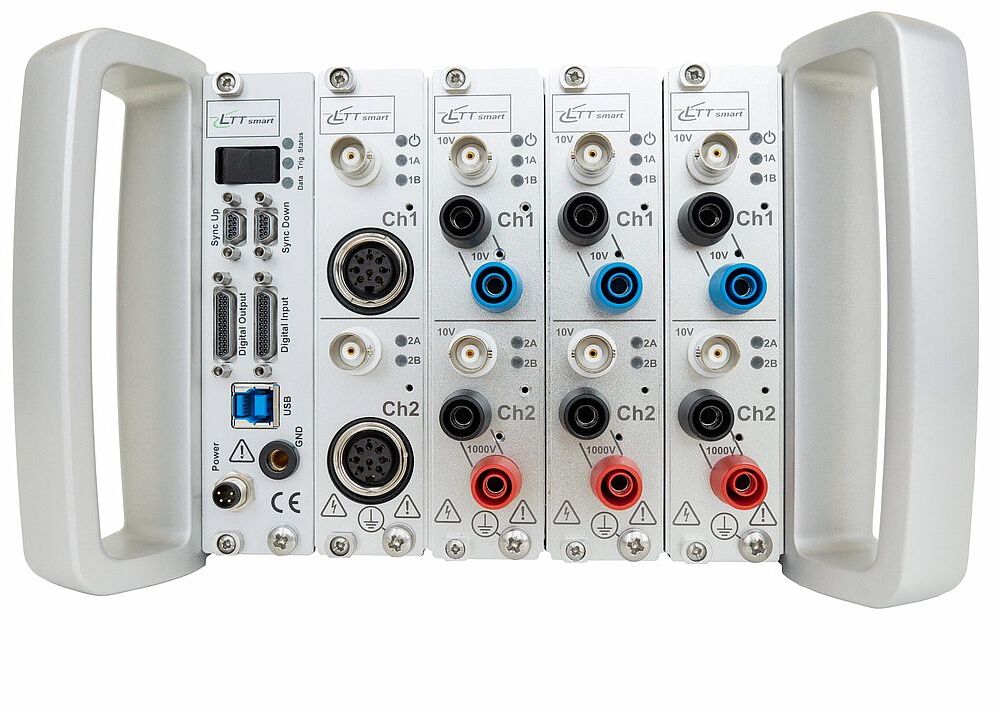

When we talk about data acquisition in today’s sense of the term, what we’re referring to is the conversion of analog data into digitalized data with the help of measurement technology. It can then be analyzed, visualized and permanently stored using the appropriate hardware and software.
This is what sets modern data acquisition (DAQ) apart from earlier methods, which involved recording on paper or tape, for example.
Data acquisition systems based on digital technology consist of four components that are used to create a complete measurement chain for physical or analog phenomena. They are:
The sensors have to work precisely and reliably, because important decisions are later made based on their signal quality, for example, that a machine will be switched off immediately should a certain fault occur. They therefore have a significant impact on the quality of the entire measurement chain. For some sensor types to work perfectly, correspondingly high-quality supply voltages or currents that must be provided by the measuring amplifiers with high precision are required.
Often, the electrical signals output by the sensors are in the microvolt range, which is why they first pass through the measuring amplifier for better evaluation.
The A/D converter then converts the now amplified analog signal into a digital data stream. This enables faultless data transfer, fast processing and long-term storage.
Using computers and the appropriate software, the data get's evaluated depending on the intended purpose.

The list of measured variables to be recorded is long. They include:
Strain and pressure (often with very high bandwidth)
Shock and vibration
Sound and ultrasound (underwater too)
Structure-borne sound
Data acquisition (i.e. the recording and storage of data) is not an end in itself. Rather, it should make it possible to analyze and visualize the measured results so that certain measures can be initiated if necessary.
In addition to the functional testing of machines and systems, data acquisition is primarily used for research and development, not to mention process optimization and quality verification of produced goods. On the one hand, quality is decisive for use. On the other, so too is the handling and interpreting of data to find an answer to further questions or to create quality protocols according to defined industry standards. The selection of the right measurement technology plays a decisive role here.
Data acquisition instruments, such as those manufactured by Labortechnik Tasler, play an important role in numerous industries, including the automotive industry, aerospace, research and development, biomedicine, neuromedicine, electromobility, energy supply and, last but not least, environmental protection.
Labortechnik Tasler specializes in the development and production of mobile measuring instruments – transient recorders, sensor encoders, power analyzers, all-in-one measuring instruments – in the high-end segment and, with more than 25 years of experience, is one of the leading manufacturers in this field. Thanks to the modular design of the measuring instruments such as the LTT24 or LTTsmart as data loggers and power analyzers, our customers benefit above all else from individual, tailor-made solutions designed to meet their specific needs. Our company also supplies the appropriate software.
To ensure the quality of the measured results, we recommend calibrating our precision instruments regularly (every two years). Of course, we will do this for you and remind you of due dates in good time. As an additional service, we offer to archive all certificates, so you can get an overview of the test certificates’ history at any time.
Would you like to learn more about measurement data acquisition and measurement technology? Read more in our basics of data acquisition part 2.
You can also obtain further information about our measurement technology simply by using the contact form.